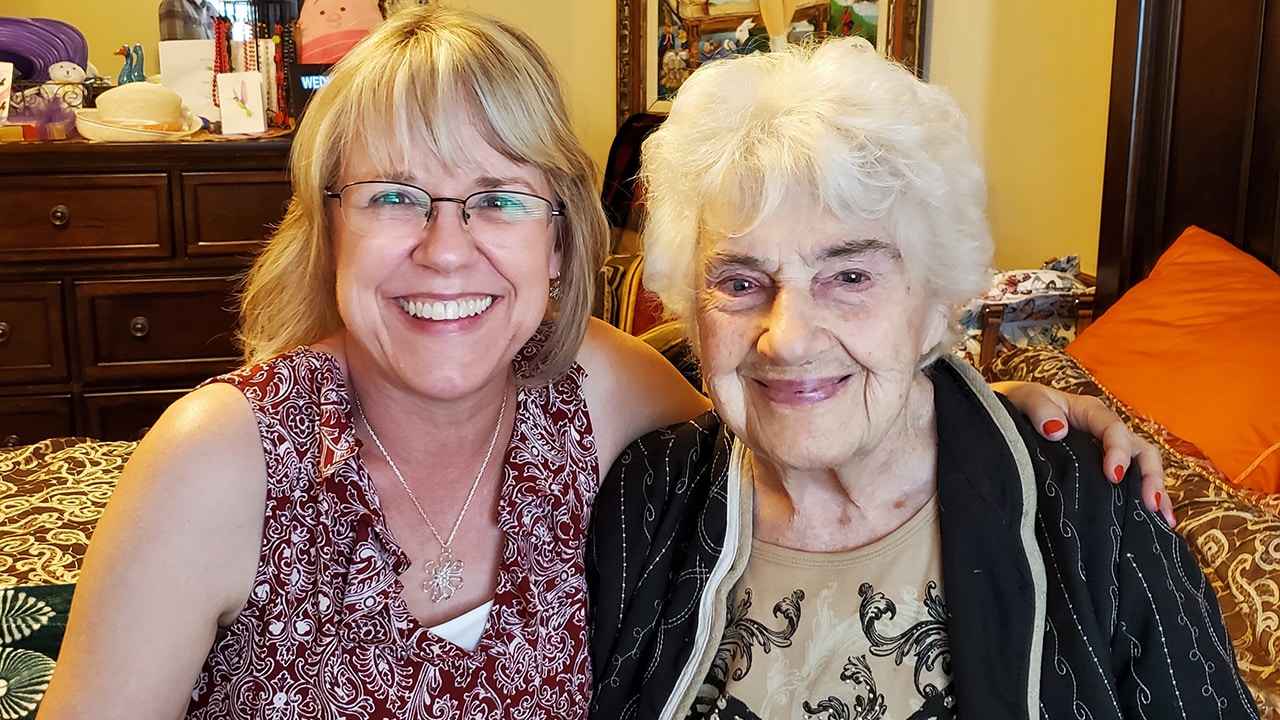Guest post from Kim Foster:
“Who’s there?” The childlike voice was panicky. I moved in closer to Alice’s makeshift bed.
“It’s me, Mom. It’s Kim. You’re at our house.” I was struck by the question, the desperate need for reassurance. She held out both arms. “You’re safe, Mom. You’re with us.” She hugged me long and hard.
As I stood up, I looked across the living room that had become a bedroom for Alice, my mother-in-law. A garment rack separated her bed from the sitting area. Tucked in a corner was a pile of camping foam pads some friends had lent us for a pallet.
I needed to sleep in the same room so I could help Alice when she needed it. And she needed it. All night, every night.
Caregiving During COVID
The pandemic changed everything. At first, I didn’t see much difference in the pace of my life. I worked at home, my office upstairs. Quarantine? No problem. I was alone during the day anyway, all communication through my computer. The only adjustment I made was ordering groceries online.
Alice was being cared for at an assisted living facility. Then her retina detached in her left eye, and she needed emergency surgery to correct it. Because of the risk of exposure to the coronavirus, the facility where she had been living wouldn’t allow her back in after the surgery. She needed 24/7 care because, in her words, “I’m blind in one eye and can’t see out of the other.”
My husband and I later learned that anesthesia will often confuse a person for a few days. For someone with dementia, though, it can scramble their brain for a couple of weeks or even months. Alice was often confused about where she was. And because she was unable to see well, she often didn’t recognize me.
After two weeks of caregiving, I was sleep-deprived and felt myself coming apart. As Mom’s sight began to slowly return, and she was able to move around solo, I moved back upstairs. After another two weeks, I realized I was existing but not resting.
I caught myself putting the milk away in the pantry. I prepared a cup of tea but couldn’t find it when the water boiled. I hadn’t left the kitchen, but I had no idea what I had done with it. I finally found it in the cupboard with other cups. I lost my vocabulary. I just couldn’t think of the right words to say, so I often pointed at what I was trying to describe.
My husband wasn’t immune either. He took a couple of aspirin out of the bottle for a splitting headache. He came back with a pitcher of water and caught himself before he poured water in the medicine bottle instead of the glass sitting next to it.
Caring for Ourselves and for Mom
My husband and I knew we had to give ourselves permission to rest. We figured out ways to give each other breaks. Coordinating with home health services helped. We also tried to get Mom involved in different activities. My husband took her for a walk every day — sometimes twice — while I tidied up her area and cleaned her bathroom. I played dominoes with her while my husband finished up teaching an online class of sixth graders. We made it work.
[For tips on self-care, check out our collection of “Caregiver Well-Being Links.”]
Alice mourned not having a garden, so we expanded our container garden to include plants just for her. When I started harvesting, she was very excited about the produce. As she sat in the shade, wearing her big blue straw hat, I often brought her leaves of mint or sprigs of rosemary. She would rub them between her fingers, close her eyes, and savor the fragrance. I’ve heard that smell is the strongest trigger for memories. She had many wonderful stories about gardening; we hoped the experience would trigger pleasant ones.
[Read “How the Sense of Smell Triggers Old and Long-Forgotten Memories” from Psychology Today.]
Alice lived with us for three months before another facility better equipped at providing memory care became available. It was the toughest three months I’ve ever spent caring for someone. But it was completely worth it. We had learned to live together, wading through bouts of dementia, grieving the loss of the woman we had known, praying for peace, and accepting the changes.
Still Caring, Still Celebrating
Alice is an amazing soul. Strong, independent, stubborn. Generous to a fault, God-fearing, loving. Her goal is to live to a hundred. She has a mantra for every year until then. For part of the time she was with us, it was “Ninety-four and going for more.” She celebrated a birthday that summer with “Ninety-five and still alive.”
The other day, she asked us how old she was. “Mom, you’re ninety-six.”
She smiled and said, “Oh, yeah. It still ticks!”
************************
Kim Foster is a freelance editor and writer who loves to share uplifting stories. She lives in Idaho with her husband, Chuck, and together they help care for his mother, Alice.


0 Comments